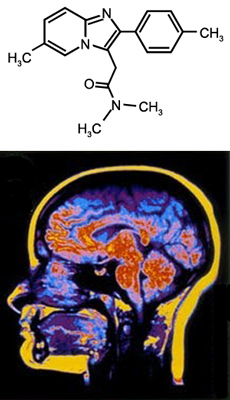A Life or A Person?
 Well, that didn't take long.
Well, that didn't take long.
Back in September, I pointed to news that the sleeping drug zolpidem (sold in the US as Ambien) could awaken patients in persistent vegetative states about 2/3s of the time; that post led to ensuing discussions of the ethical and legal issues that could emerge from this discovery (see here and here). The first of what may end up being many legal battles over the use or non-use of this treatment has now taken place in the UK. Perhaps surprisingly, the position taken by the family of the patient was to reject the use of zolpidem, and to allow their relative -- who had suffered serious brain trauma -- to die in peace. The doctors, conversely, wanted to try the drug, and the high court agreed with the doctors.
The family clearly realized something I mulled in the last of the three pieces from September: that just because zolpidem may "awaken" the PVS patient, the severe physiological trauma that produced the state remains, and the quality of life of the newly awakened patient may be torturous for both the patient and family.
We already live in a world in which medical science can keep a body alive despite horrific damage; we're approaching a world in which the same will hold true for the brain. But what does "alive" mean in this context? The more we understand life as a purely mechanical function -- the muscular action and the chemical flows and whatnot -- the more it becomes necessary for our culture to separate being "alive" from being "a person." Our norms and values around human life emerged from a time when the "breath of life" and the "beating heart" were truly indicative of a living person; now we can instill both in a body, almost regardless of any other trauma. We now declare death to be the lack of brain function... but what happens when we can stimulate some level of brain function, almost regardless of any other trauma?
For some of us, these are academic questions, provocations to be discussed around a lecture hall or coffee table; for others, they are moral questions, with a clear, immutable answer. But, as this case should remind us, for some people, these are deeply personal questions, about a loved one who once laughed, and felt, and thought, and truly lived. Let's not lose sight of that.






Comments
Great article, Jamais. Learning to distinguish between "person" and "human being" may be an unpalatable effort for many of us, but it will become much more obvious over time that it is a necessary and important distinction.
Posted by: Mike Treder | November 21, 2006 5:41 AM
A primary factor in this sort of discussion is probably also that of what wishes the injured/comatose/etc. individual expresses prior to experiencing whatever trauma put them into that state.
I would say that if the person expresses a desire to be kept as intact as possible, this might entail something like granting the family permission to put their loved one in cryonic suspension before the brain deteriorates further (if brain-deterioration is part of the prognosis of the trauma effects).
Posted by: annec | November 21, 2006 10:09 PM